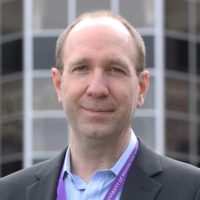HELP TRAIN TOMORROW’S LEADERS
Be part of the future of precision medicine with a gift to the Medical Scientist Training Program Education and Enrichment Fund.
GIVE NOW >Serving MD, MD/PhD, Res., Fel., PhD, PA-C (MEDEX), MA, MS, BS, PT, OT and P&O alumni, your UW School of Medicine Alumni Association is the place to connect with your classmates, your School and the next generation of medical professionals.

850 Republican Street, C-5
Seattle, WA 98195-8045
 Twenty-two years ago, Colin Pritchard, PhD ’05, MD ’07, Res. ’10, Fel. ’11, attended a guest lecture that set the trajectory of his career in medicine.
Twenty-two years ago, Colin Pritchard, PhD ’05, MD ’07, Res. ’10, Fel. ’11, attended a guest lecture that set the trajectory of his career in medicine.
The speaker was Stephen Friend, MD, PhD. He was then the CEO of Rosetta Inpharmatics, a software analytics company dedicated to genomic research — the study of all of a person’s genes (the genome) as well as how those genes interact with each other and the environment. Using leading-edge DNA microarray technologies that allowed them to analyze entire grids of DNA sequences, Friend and his team were on the front lines of developing diagnostic tests to identify genetic indicators of cancer risk in patients.
Pritchard was only in his second year at the University of Washington School of Medicine, but he knew he had stumbled upon a new passion even before the lecture ended.
“I was drawn to the idea that we could test thousands of genes and gene fragments at once to profile cancers and apply that to clinical practice,” Pritchard says. “I had never seen anything like it.”
Laying the groundwork
Pritchard didn’t start out studying science. When he came to the UW as an undergraduate, he was a philosophy major. But he quickly added a second major in biochemistry in order to become a stronger candidate for medical school.
“The idea of medicine became appealing to me as I recognized its potential opportunity for large-scale impact,” says Pritchard.
He joined the lab of the late Nelson Fausto, MD, who chaired UW Medicine’s Department of Pathology at the time. Under Fausto’s guidance, Pritchard discovered a fascination with laboratory science that has yet to wane. He spent the next eight years pursuing MD and PhD degrees through UW Medicine’s Medical Science Training Program (MSTP).
Following Friend’s lecture, Pritchard sought out mentors who could help him explore microarray innovations in the lab. Thanks to UW Medicine’s vast network of scientists and research physicians, he connected with Peter Nelson, MD, of Fred Hutchinson Cancer Research Center, who was applying microarray technologies to study the genetics of prostate cancers.
“I was fortunate to be one of the first PhD students to work in Dr. Nelson’s lab,” Pritchard says. “Through that work, including building my own microarray device, it became increasingly clear that I wanted to pursue a laboratory medicine career focused on genetics in cancer.”
Right place, right time
Pritchard began his residency at UW Medicine in 2008, just as three key genetic discoveries were reshaping the field of cancer research.
First, researchers discovered that mutations in the KRAS gene — which contributes to the development of cancer by accelerating cell division — inhibited drug treatments in 50% of colon cancer cases.
Second, scientists found that mutations to a gene called EGFR could predict how well drug treatments would work for certain types of lung cancer.
Third, researchers identified that certain mutations in the BRAF gene, which is common in melanoma and other cancers and determined a patient’s responsiveness to treatment.
With the convergence of these discoveries, it became clinically imperative to develop tools to identify whether patients had these mutations — and, if they did, to determine the most effective treatment plan. Tests that could accurately detect a patient’s predisposition to cancer would help doctors quickly treat early-stage cancer or prevent the disease altogether.
Throughout his residency, Pritchard and his mentors played an instrumental role in developing, validating and implementing diagnostic tests for each of these three genes in clinical practice. These efforts would eventually lead to the creation of the Genetics and Solid Tumors Laboratory in UW Medicine’s Department of Laboratory Medicine and Pathology’s genetics division, a program Pritchard helped build from the ground up.
Today, Pritchard co-directs the UW Medicine Genetics and Solid Tumors Laboratory and is the head of precision diagnostics at the Brotman Baty Institute. He cites his time in residency as a crucial jumpstart for his career. In addition to collaborations with UW Medicine’s Mary-Claire King, PhD, and Tom Walsh, PhD, he is grateful to have been able to conduct research with scientists at institutions like the Fred Hutchinson Cancer Research Center.
“Making those connections and receiving high-quality mentorship early on paid off when I moved into a full-time faculty role at UW Medicine,” Pritchard says. Someday, he hoped, he could make similar career-launching opportunities possible for other students.
An unrivaled breakthrough
Pursuing his quest to develop genetic tools that could detect cancer risk factors, Pritchard became part of the team that brought next-generation sequencing (NGS) to UW Medicine laboratories. Invented in 2005, NGS is a highly advanced technology in precision medicine that can sequence an entire human genome in a single day. By 2011, the technology was mature enough for researchers to use in clinical research settings.
In an interdepartmental effort to harness the true potential of NGS, Pritchard and his colleagues developed a gene panel that could identify inherited cancer risk factors. Based on the BROCA cancer risk gene panel developed by Drs. King and Walsh, Pritchard and his team created the ColoSeq™ Tumor Panel test to detect genetic risk factors in colon cancer. And, in what he describes as the “flagship test” of UW Medicine, they also launched the UW-OncoPlex™ Tumor Test, a multigene panel that assesses over 350 genes and their mutations to detect cancerous tissue.
“It’s been incredibly rewarding to watch UW-OncoPlex™ grow over time along with advances in cancer care,” says Pritchard. “When we first launched the test, immunotherapy was in its infancy. Now, it’s one of the most important aspects of cancer treatment. With UW-OncoPlex™, we can also identify genetic predisposition mutations, which sets the stage for cancer prevention.”
The future of precision medicine
Pritchard’s successes recently captured the attention of Scientific American, earning him the 2021 Catalyst for Precision Medicine Award, which includes a $50,000 prize. Wanting to pay it forward, Pritchard donated the entire sum to UW Medicine students in the Medical Scientist Training Program (MSTP) interested in pursuing molecular cancer diagnostics research.
“I have been so lucky to benefit from the people at UW Medicine and its partners,” Pritchard says. “By welcoming more students through our doors, I hope to mentor them and contribute to fostering new cancer research leaders.”
Pritchard and his team continue to make major strides at the intersection of genetics and oncology research. Currently, they are developing novel tests for prostate cancer that account for how inherited genetic variants impact a person’s risk for developing cancer. They also continue to build out the UW-OncoPlex™ portfolio, and recently found that men with inherited mutations in the TP53 gene may be up to 20 times more likely to develop prostate cancer.
And, he says, there’s much more to be done.
“We are only scratching the surface of what’s possible for precision medicine and cancer research,” Pritchard says. “In the future, I think all cancer patients who need to see an oncologist will receive genetic testing in some form to help guide treatment and determine familial risk. We look forward to scaling our testing programs at UW Medicine to be ready for this new era of genomic medicine.”
By Stephanie Perry
____________
Video courtesy of
Your Cancer and Astra Zeneca’s Cancer Community Awards 2021
Dr. Pritchard is the head of precision diagnostics at the Brotman Baty Institute for Precision Medicine, which fosters collaborative work among researchers in genomics, bioinformatics and data science. Watch this video to learn about his award-winning work to create a brighter future for cancer patients and their loved ones.
______________